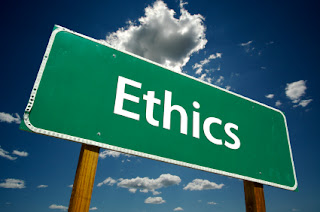 “Ethics refers to the study of moral principles, or “right and wrong”, therefore marketing ethics is all about marketers doing the right thing.”
“Ethics refers to the study of moral principles, or “right and wrong”, therefore marketing ethics is all about marketers doing the right thing.”
The above statement might be a clear cut definition. But in the real marketing
world, it is not always completely clear cut, since “what is right” may
vary depending on whether you are looking at it from the perspective of
the company.
Let we take the example of ITC in India or BAT in Nigeria. Their primary business is selling cigarettes. We all will agree that cigarette spoils the health, causes life threatening diseases.
Let we take the example of ITC in India or BAT in Nigeria. Their primary business is selling cigarettes. We all will agree that cigarette spoils the health, causes life threatening diseases.
Is it
ethical for ITC or BAT to sell cigarettes? This will be dicey to answer.
However what is expected to be followed by ITC or BAT is relative Marketing Ethics.
Here what I mean by Relative marketing ethics is, being to an extent fairer. Not targeting the product to audience of age lesser than 18. Not making the product available in half a km radius surrounding the schools. Accepting and putting clear warning pictorials on the package etc.
The same applies for various industries like liquor industries, fast food chains etc.
But in reality, with a few exceptions, almost all companies flout the ethics, either its direct or relative. This includes our own industry - Pharmaceuticals. Sad to say, probably ours might be one of the worst in the scenario.
Among the professions, some are called as noble ones, because you make money by saving the people lives. We can consider Pharmaceuticals and Medical Doctors in this line. But these noble profession people have become the leaders of flouting the marketing ethics. We don’t know whether the Doctors spoiled the Pharmaceutical companies or vice versa. This is a very bad situation and in the near future nothing visible change is seen, not only in Nigeria or India, but throughout the world.
But if the following basic ethics is followed, it would be better for the world.
Taking responsibility: For the products and the decisions. Don’t ever tell “it was what the customer wanted”
Deal fairly: Being honest & fair with all stake holders.
Respect Customer rights: Right of redress, information & privacy.
Here what I mean by Relative marketing ethics is, being to an extent fairer. Not targeting the product to audience of age lesser than 18. Not making the product available in half a km radius surrounding the schools. Accepting and putting clear warning pictorials on the package etc.
The same applies for various industries like liquor industries, fast food chains etc.
But in reality, with a few exceptions, almost all companies flout the ethics, either its direct or relative. This includes our own industry - Pharmaceuticals. Sad to say, probably ours might be one of the worst in the scenario.
Among the professions, some are called as noble ones, because you make money by saving the people lives. We can consider Pharmaceuticals and Medical Doctors in this line. But these noble profession people have become the leaders of flouting the marketing ethics. We don’t know whether the Doctors spoiled the Pharmaceutical companies or vice versa. This is a very bad situation and in the near future nothing visible change is seen, not only in Nigeria or India, but throughout the world.
But if the following basic ethics is followed, it would be better for the world.
Taking responsibility: For the products and the decisions. Don’t ever tell “it was what the customer wanted”
Deal fairly: Being honest & fair with all stake holders.
Respect Customer rights: Right of redress, information & privacy.
(This is a jest of a presentation made by me as a panel member in the Symposium conducted by The School of International Studies, Pondicherry University)
